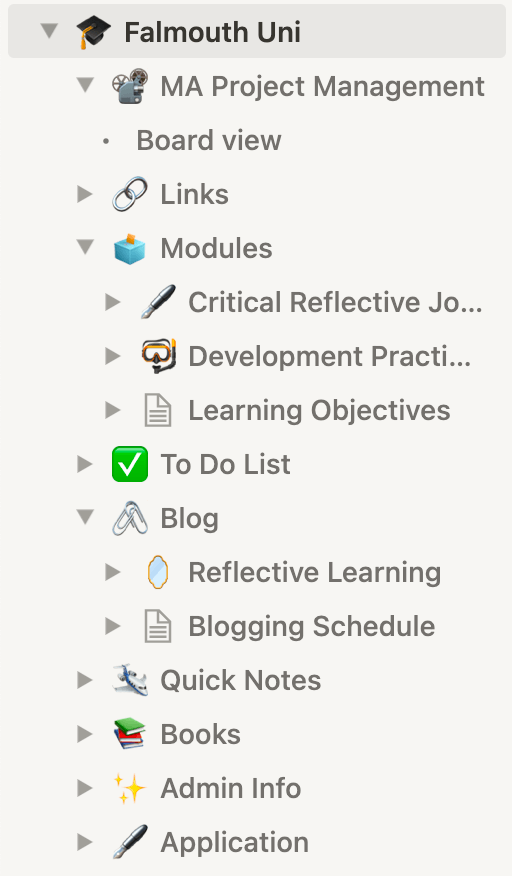Introduction
Beginnings can be tough. There is uncertainty, unfamiliarity, self-doubt, a little excitement. Beginnings can set the tone, they are first impressions, they can last, they are as important as endings!
What follows below are some of my experiences of beginning a Masters course in User Experience Design (UXD), what I found helpful, and how I can relate this experience to wider insights into UXD.
Uni Beginnings
Although this is not my first time at university, the 30th May 2022 marked the beginning of studying at Falmouth University on the MA in User Experience Design. Reflecting on my experiences leading up to this date and the first week underway, I went through the uncertainty, unfamiliarity, self-doubt and excitement that is characteristic of most beginnings.
So Many Apps, So many choices!
One thing that stood out to me during this time was the amount of ID's, logins, passwords, and applications that I needed to install on different devices, and figure out how to use. For example, there's an application portal, a student number, student ID number, an ID portal, a payment portal, a MyFalmouth portal, Canvas or Learn application, Office 365, discord server, about 3 email inboxes, dashboards, profile accounts, calendars, conferences, forums, deadlines, submissions, introductions, etc.
That's kind of overwhelming for anyone!
FOMO (Fear of Missing Out), aka ANXIETY
Reflecting on how this barrage of information and tasks to complete was affecting me, I noticed that one of my concerns was that I may have missed something, an important piece of information, an important message. This grew into concerns as to how I would manage the course amongst my daily work and family commitments, would I pass, would I be good enough, have I made a mistake?
Things that helped
Here are a couple of things that helped me through the first week (apart from healthy eating, exercise, and cold showers):
Trusting the Process
I'm not the only person going through this process, there are fellow students who are in the same position as I. That's good to remember. Also, there are course designers, tutors and university staff who have used all their expertise and knowledge to create the course and help students to succeed. Further, I need to trust my own resources, that the process I go through will guide me to overcome obstacles and challenges.
Creating Structure
I decided to use Notion application to help me through this course, to find and create structure, to serve as a quick reference. Here is a screenshop of how I have structured the pages so far:

Wider UXD Insights
Reflecting on my first experiences as a masters student made me think of a couple of issues relating to the field of UXD in general:
Performance & The 2 second rule
Website or application load time could be considered as a user's first experience of a product of service. In 2010 Google research (‘You and Site Performance, Sitting in a Tree... | Google Search Central Blog’ 2022) shows that websites that take longer than 2 seconds to load leave a negative impression on visitors. Website or application performance is important in creating positive UX.
Choice Overload / User Overwhelm
So many apps, so many choices, this experience made me think of a famous study by psychologists Sheena Iyengar and Mark Lepper from Columbia and Stanford University. They studied jam sales at a local food market, on one day there would be 24 different flavours of jam for sale, and on another day there would only be 6 flavours available. Interestingly their findings were higher jam sales when there were only 6 flavours of jam available. They conclude that, "...although having more choices might appear desirable, it may sometimes have detrimental consequences for human motivation." (Iyengar and Lepper, 2000, p.1003)
Nielsen Norman Group speak further along these lines, stating that too many offerings make for harder decisions due to analysis paralysis, as well as increased buyer's remorse. This speaks to my experience of feeling overwhelmed and even considering whether I'd made a good choice.
Conclusion
Generally when something is done, in hindsight, it all looks ok, possible, clear, of course. But when in the midst of figuring it out things are confusing, overwhelming, and anxiety provoking. Knowing this can inform how we as UX designers approach providing a user's beginning experiences. It can start with technology which ensures speed and performance, to the amount of products and services on choice, information architecture, instruction videos, help links, dashboard tutorials, FAQ's, call-to-actions, etc. Remember your user is there for the first time, they do not know what is going on. Try to help them, try to provide them love at first experience.
For further study it would be interesting to read articles about Cognitive Overload.
References
IYENGAR, Sheena S. and Mark R. LEPPER. 2000. ‘When Choice Is Demotivating: Can One Desire Too Much of a Good Thing?’ Journal of Personality and Social Psychology 79(6), 995–1006.
‘You and Site Performance, Sitting in a Tree... | Google Search Central Blog’. 2022. Google Developers [online]. Available at: https://developers.google.com/search/blog/2010/05/you-and-site-performance-sitting-in [accessed 5 Jun 2022].


